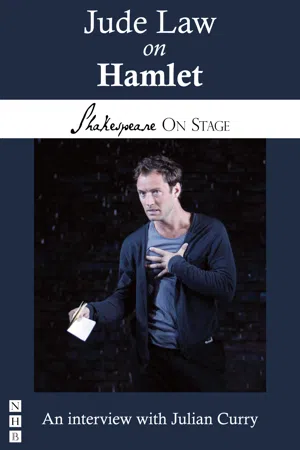![]()
Hamlet may or may not be the greatest play ever written, but it is certainly one of the most written about. It has been analysed, interpreted and argued over from countless perspectives. The old Arden edition had 152 pages of ‘Longer Notes’, devoted to the detailed examination of tricky passages of text. By contrast, Antony and Cleopatra had just three such pages.
Hamlet is Shakespeare’s longest play. It is a jewel in the late Elizabethan crown. Hamlet is a man whose theatrical antecedents stretch back to the Middle Ages, yet whose thoughts echo timelessly through world culture. The play is a masterpiece: a thrilling drama of revenge, politics and inner turmoil, that has never been off the stage since it was written. In the past four hundred years Hamlet has been played by the leading actors, male and occasionally female, of each successive epoch. He is the most intriguing, yet ultimately unfathomable, of Shakespeare’s creations. One can never know everything about him. As the critic Hazlitt commented: ‘It is we who are Hamlet.’ A university student, Hamlet is philosophical and contemplative. He is plagued with questions that cannot be answered with any certainty. It is through the play’s five towering soliloquies that the audience gets closest to understanding the workings of Hamlet’s mind and imagination. He is thoughtful to the point of obsession, yet on occasion he can behave rashly and with surprising rapidity, as when he impulsively kills the hidden Polonius.
The play investigates madness, both real and feigned. Hamlet appears effortlessly to assume the role of a madman, with erratic behaviour, wild speech and sudden sharp innuendo. Yet the audience is often left uncertain as to whether they are watching the genuine article or an accomplished fake. His mood ranges from overwhelming grief to seething rage, as the playwright explores themes of treachery, revenge, love, lust, incest and moral corruption. Shakespeare endows Hamlet with brilliant verbal dexterity. His words may mean several things at once, indicating his fragmented thoughts and disturbed emotions.
His melancholy and discontent are frequently counterpointed with wit, which is facilitated by chunks of the play being in prose, as for instance when he needles Polonius after the ‘play-within-the-play’ [3.2]:
— Do you see yonder cloud that’s almost in shape of a camel?
— By th’mass and ’tis like a camel indeed.
— Methinks it is like a weasel.
— It is backed like a weasel.
— Or like a whale?
— Very like a whale.
Though not always funny, such repartee could only come from the lips of a person with a heightened sense of the absurd. His banter is often defensive/aggressive, as of a man on guard against real or imagined enemies. For all Hamlet’s profundities, a nimble wit is never far below the surface. He repeatedly sees comedy in the bleakness of his situation. ‘What news?’ he asks Rosencrantz. ‘None, my lord, but that the world’s grown honest,’ joshes his fellow student. To which Hamlet replies ‘Then is doomsday near’ [2.2]. It is a response worthy of Samuel Beckett.
There are Hamlets for every generation, often made memorable by a special quirk. David Warner wore an endless scarf, Mark Rylance was in pyjamas, and Jonathan Pryce startlingly ventriloquised the Ghost and spewed it up from his own entrails. When Ian McKellen played Hamlet in the West End, Mander and Mitchenson, a legendary pair of first-nighters, came backstage. ‘Congratulations! You are our twenty-eighth Hamlet!’ ‘Twenty-eighth?’ said Ian. ‘How on earth do you remember them all?’ ‘Well, there’s always something special, something that marks a performance out from the rest. For instance, John Neville, we’ll never forget, had a tiny hole in his tights’ – pointing to the crotch – ‘right there!’ I treasure this story, not only because it makes me laugh. It puts what we do into perspective. Imagine being cast as Hamlet, the great part, the pinnacle of an actor’s ambition. You excitedly tell friends and relatives. You research and prepare, eager to put your own stamp on the part. You rehearse. The first night arrives. Your dressing room oozes with flowers and good-luck messages. At the post-show party champagne flows, you’re embraced and told you were excellent. Next morning you run out to buy the papers and find your performance praised. You’re over the moon. But wind the clock forward ten years, and what is your Hamlet remembered for? A tiny hole in the crotch of your tights.
I’d worked with Jude Law on the film Sky Captain and the World of Tomorrow, a movie shot entirely against blue screen, with everything except the actors computer-generated, and ‘put in’ afterwards. This involved unusual challenges. I remember, for instance, the astonishing spectacle of Jude fighting a robot that wasn’t there yet. We met...
